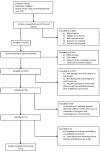The Effects of Low-Carbohydrate Diets on Psychosocial Outcomes in Obesity/Overweight: A Systematic Review of Randomized, Controlled Studies
- PMID: 27367726
- PMCID: PMC4963878
- DOI: 10.3390/nu8070402
The Effects of Low-Carbohydrate Diets on Psychosocial Outcomes in Obesity/Overweight: A Systematic Review of Randomized, Controlled Studies
Abstract
Background: Little is known about the relative psychosocial effects of carbohydrate reduction in comparison to other weight-loss diets in subjects receiving treatment for obesity/overweight. We, therefore, set out to conduct a systematic review of the psychosocial outcomes of such patients, treated by means of either a low-carbohydrate diet or an isocaloric diet of other macronutrient composition.
Methods: Literature searches, study selection, method development, and quality appraisal were performed independently by two authors, and data were synthesized using a narrative approach, in accordance with the Preferred Reporting Items for Systematic Review and Meta-Analyses (PRISMA) guidelines.
Results: Eight randomized controlled studies met the inclusion criteria, and their subsequent analysis revealed that improvements in psychological and social outcomes do occur during short- and long-term weight loss programmes, but that low-carbohydrate diets have no greater effect on psychosocial outcomes when compared to diets of different macronutrient composition at either short- or long-term follow-up (one-year). However, the lack of studies with longer duration follow-up, and the absence of data in the adolescent population limit the generalizability of our findings.
Conclusion: The short- and long-term improvements in psychosocial outcomes seen in patients undergoing weight-loss treatment appear to be independent of the macronutrient composition of their diet.
Keywords: anxiety; depression; low-carbohydrate diets; mood; obesity; overweight; psychosocial outcomes; weight loss.
Figures
References
-
- Taylor C.B., Ferguson J.M., Reading J.C. Gradual weight loss and depression. Behav. Ther. 1978;9:622–625. doi: 10.1016/S0005-7894(78)80137-3. - DOI
Publication types
MeSH terms
LinkOut - more resources
Full Text Sources
Other Literature Sources
Medical
Miscellaneous


